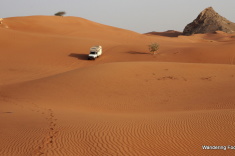Pt II (written July 31st) I’ve just returned from another day of close encounters with the wild. These encounters, however, took place a world away from the bushland of Zimbabwe.
I am now in the land of Ecuador. A land whose landscape is as varied as an entire continent, with its coasts, deserts, mountains, and jungles meeting at the center of the world. If I were here for more than 15 days, I’m sure I’d have amazing close-encounter stories from each of these distinct regions of Ecuador. Alas, I’m not, so my encounters today happened from the coast – the obvious choice for a beach-lover like me. I was brought to the Isla de la Plata by Nathan and Ara (whom I will talk more about in a blog entry whose topic isn’t close encounters with the wild – although they are wild in their own way and I’ve certainly had my fair share of close encounters with them this week!) Translated into English, the island is called “Silver Island”. This name was chosen because the famous bird that lives on it – the blue-footed booby (holla!) – pools all over the place, and when its dried dung shines in the sun, it makes the island look silver.
I was brought to the Isla de la Plata by Nathan and Ara (whom I will talk more about in a blog entry whose topic isn’t close encounters with the wild – although they are wild in their own way and I’ve certainly had my fair share of close encounters with them this week!) Translated into English, the island is called “Silver Island”. This name was chosen because the famous bird that lives on it – the blue-footed booby (holla!) – pools all over the place, and when its dried dung shines in the sun, it makes the island look silver.
The Isla de la Plata is also known as the “Poor Man’s Galapagos” because you can get there for $35 rather than $3500! Probably not quite as stunning or entensive and with no human culture to explore, but with a similar landscape. And, of course, the booby, one of Galapagos’ famous birds.  You notice these birds because of their unique blue flippers. But you fall for them because of their dopey faces with blank yellow eyes that follow you as you sneak past them on the path. Yes, strangely these birds will actually let you approach them, even within less than a meter!
You notice these birds because of their unique blue flippers. But you fall for them because of their dopey faces with blank yellow eyes that follow you as you sneak past them on the path. Yes, strangely these birds will actually let you approach them, even within less than a meter!
You almost always find boobies in pairs (hahah!). They are merely mates for a season, but seem nonetheless to quickly form a strong bond; the man singing to his woman, and that woman squawking back (remind anyone of a human relationship???). The female also has massive pupils and is bigger than the male, so even when they aren’t making noises it’s easy to tell them apart.
We learned a lot of facts about these blue-footed boobies (and their white cousins) while on our day-tour, but the most interesting fact is that they are able to desalinate water in their throats. Goes to show how much smarter mother nature is than man!
Close encounters with boobies, check. (Never thought I’d share THAT on my blog!). But that’s not all, folks. For, on our boat ride back to shore we had a close encounter with humpback whales! This is the close encounter I actually wanted to talk about, for it left me breathless, teary-eyed, and feeling so incredibly small. As I watched in awe as whale after whale danced beside our boat, I was filled with both ecstacy and sadness. Ecstacy, because these gigantic creates were as close as 10m from us, spurting water from their blowholes, showing off their fins and tails as they swam alongside us, and jumping high up in the air, spinning 360s, and then crashing back down into the water so hard it made the boat vibrate!
But that’s not all, folks. For, on our boat ride back to shore we had a close encounter with humpback whales! This is the close encounter I actually wanted to talk about, for it left me breathless, teary-eyed, and feeling so incredibly small. As I watched in awe as whale after whale danced beside our boat, I was filled with both ecstacy and sadness. Ecstacy, because these gigantic creates were as close as 10m from us, spurting water from their blowholes, showing off their fins and tails as they swam alongside us, and jumping high up in the air, spinning 360s, and then crashing back down into the water so hard it made the boat vibrate! And sadness… because these peaceful, majestic creatures were here long before us. And they will probably disappear because of us. How is it that creatures as small as humans can have such an impact on creatures as massive as whales? Or elephants? Or lions? Or hipps? Or boobies? We, who believe ourselves to be intelligent, and morally superior. We, who are actually so small. Why is it that so few realize it, that it takes these close encounters with the wild to remind us just how small, and just how un-intelligent, we actually are?
And sadness… because these peaceful, majestic creatures were here long before us. And they will probably disappear because of us. How is it that creatures as small as humans can have such an impact on creatures as massive as whales? Or elephants? Or lions? Or hipps? Or boobies? We, who believe ourselves to be intelligent, and morally superior. We, who are actually so small. Why is it that so few realize it, that it takes these close encounters with the wild to remind us just how small, and just how un-intelligent, we actually are?
Angry Postcript (written Aug. 3rd)
Humanity? What humanity?
I just saw a dead humpback whale wasted up on the beach. The same kind of whale that took my breath away merely three days ago.
And around him, people taking photos. But not just of the whale. Of themselves posing in front of her. Warrior poses, smiles, thumbs up…
It reminds me of an experience I had back in June, as Rory and I were driving to Mozambique. On the road, an oil tanker had exploded had exploded, and the fire balls crashing out of it were quite the sight to behold. The entire nearby town, it seemed, had shown up to watch those flames float up into the sky. People took photos. But no one tried to help the four people trapped inside the tanker.
A white couple in a car behind me came up to ask me what happened. When I told them, the man’s reaction was, “Oh dear, we’re gonna be here for a few hours – it’s cutting into my holiday time!” And the woman’s was even more horrendous, for she wanted to go get a close up view of the bodies, later reporting to us – as though I wanted to know – that they were merely charred skeletions now. I wouldn’t have been surprised if she’d taken a photo of herself in front of the blast, smiling and thumbs-upping the camera and she jumped into warrior pose.
I thought humanity was a term encompassing positive words like goodwill, kindness, empathy, a community of humans, charmingly flawed in their humanE nature. Now, I wonder if humanity really encompasses heartlessness, selfishness, self-interestedness, and is defined by a group of people bent on destroying the eath while smiling, and thumbs-upping one another.
Humanity? Sure, we’re full of it.


